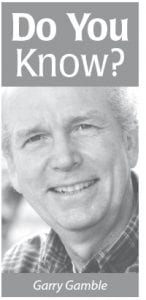While Theodore Roosevelt of the so-called “Bull Moose Party” and William Taft–the last president with facial hair–wrangled over Republican Party votes, Woodrow Wilson sauntered into the White House as a Democrat in 1912 and seized the opportunity to introduce a new federal income tax, authorized by the 16th Amendment.
Wilson, like most politicians, I expect, was a man in conflict with his own assertions. On the one hand he accused the Republican Party of existing “for those who want to consult their grandfathers about everything.” Then–with oratorical eloquence–“ The Phrasemaker,” as he was nicknamed, espoused: “A nation which does not remember what it was yesterday, does not know what it is today … We are trying to do a futile thing if we do not know where we came from or what we have been about.”
Go figure …
Noah Webster–a man who certainly knew something of words–observed on the 26th anniversary of The Declaration of Independence in 1802: “Nations, like individuals, may be misled by an ardent enthusiasm, which allures them from the standard of practical wisdom, and commits them to the guidance of visionary projectors. By fondly cherishing the opinion that they enjoy some superior advantages of knowledge, or local situation, the rulers of a state may lose the benefit of history and observation, the surest guides in political affairs; and delude themselves with the belief, that they have wisdom to elude or power to surmount the obstacles which have baffled the exertions of their predecessors.” (Did you get through that?)
Referred to as the “Father of American Scholarship and Education,” Webster forewarned, “The approaches of despotism, under cover of popular favor, are insidious and often deceive the most discerning friends of a free government.”
Thomas Jefferson, in a letter to his friend Edward Carrington, Paris May 1788: “The natural progress of things is for liberty to yield, and government to gain ground.”
What Jefferson was saying is pretty much sized up well by former President Gerald Ford in 1974 when he borrowed the phrase: “A government big enough to give you everything you want is a government big enough to take from you everything you have.”
Writers for Stansberry Research presented a sobering commentary on government in their 2010 newsletter, “The Crux”:
“Over the past several decades, no matter which political party has been in power the government has continued to become a larger part of our lives. These days many people are speaking of the ‘nanny state’ that we have created, but the reality is far worse than that. The truth is that the government has become a gluttonous, out of control behemoth that is gobbling up everything in sight and that is attempting to exert full spectrum dominance over our lives. This is in direct contradiction to the concept of a ‘limited government’ that our Founding Fathers tried so desperately to enshrine in our founding documents.”
“The concept that government holds the power to create rights has a dangerous corollary: such a government therefore is bestowed with the general power to destroy or withhold rights,” cautions Scott N. Bradley, author of the book, To Preserve the Nation: In the Tradition of the Founding Fathers.
James Madison (1751-1836), whose ability to dive deeply into ancient philosophy built a foundation for his influential ideas, discerned: “There are more instances of the abridgment of the freedom of the people by gradual and silent encroachments of those in power than by violent and sudden usurpations. Where an excess of power prevails, property of no sort is duly respected. No man is safe in his opinions, his person, his faculties, or his possessions.”
Don’t believe it?
Read next week’s column …



Loading Comments